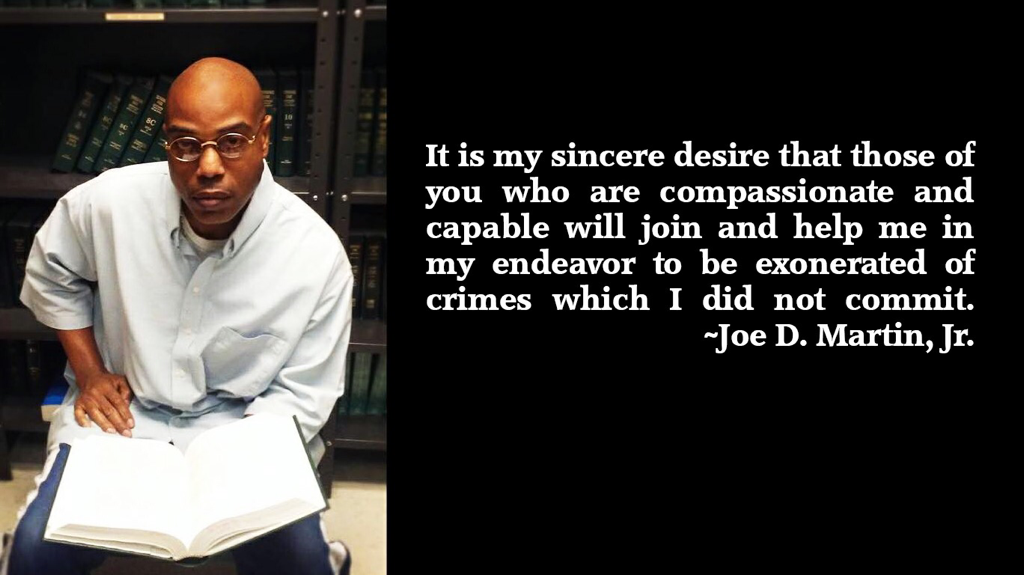|
Joe is innocent yet he is in his 27th year of a 60 year life sentence with no options for release before 2048- Joe will be 80 years old at that time. The case against Joe D. Martin Jr. relied on unreliable testimony and no physical evidence. Why is he still behind bars?
In Tennessee, a life sentence means exactly that – life behind bars, without the possibility of parole. There is a Life Without Parole (LWOP- natural life) and a second Life (60 years) with no parole option, but a possibility of release at 51 years. This inhumane practice is not only cruel but also goes against the principles of rehabilitation and redemption that the justice system is supposed to uphold. The practice of life sentences without the possibility of parole has been in place in Tennessee since 1995. Since then, the state has sentenced more people to die in prison than any other state in the country. In fact, nearly 3,500 people in Tennessee are currently serving life without parole sentences. One of the major issues with this practice is that it does not allow for redemption or rehabilitation. A Life sentence in Tennessee is a death sentence, but instead of being executed, the person is forced to spend the rest of their life in prison, without any hope of ever being released. This is especially troubling when we consider that many people who are sentenced to life without parole committed their crimes when they were very young and may have the potential for rehabilitation and change- not to mention the countless innocent people in prison. Another issue with life without parole sentences is that they disproportionately affect people of color and those who are economically disadvantaged. Research has shown that African American defendants are more likely to be sentenced to life without parole than white defendants, and that this practice is often used as a way to coerce defendants into taking plea deals, even if they are innocent. Furthermore, life without parole sentences put an enormous strain on the state's resources. Housing someone in prison for the rest of their life is expensive and does not address the root causes of crime. Instead, we should be investing in programs that address issues such as poverty, addiction, and mental health, which are often at the root of criminal behavior. There is a growing movement in Tennessee and across the country to end life without parole sentences- and shorten the 60-year life sentence to 30 years. Advocates argue that this practice is not only inhumane but also ineffective at reducing crime rates. In addition, many states have found that allowing for the possibility of parole can lead to positive outcomes, such as reduced costs and improved public safety. In conclusion, life without parole sentences are an inhumane practice that should be abolished. Not only do they go against the principles of redemption and rehabilitation, but they also disproportionately affect people of color and those who are economically disadvantaged. Instead of locking people up for the rest of their lives, we should be investing in programs that address the root causes of crime and provide people with the opportunity to rehabilitate and reintegrate into society. It is time for Tennessee to join the growing movement to end life without parole sentences and create a more just and humane criminal justice system.
1 Comment
The criminal justice system is complex, and it is not uncommon for multiple defendants to be charged in the same crime. In some cases, co-defendants may be offered plea deals in exchange for their testimony against their co-defendants. However, these plea deals can often result in wrongful convictions and leave innocent individuals behind bars.
When co-defendants are offered plea deals, they are typically given a reduced sentence in exchange for their cooperation. This cooperation often involves testifying against their co-defendants in court. In some cases, co-defendants may falsely implicate their co-defendants in order to receive a more lenient sentence. One notable example of this is the case of Joe D. Martin, Jr. In 1996, three young men were convicted of the brutal murder of 12 year old Jeremayer Warfield, in a drive by shooting, in Nashville, Tennessee . The case relied heavily on the testimony of a separate co-defendant, who was offered a plea deal in exchange for his testimony against the other three defendants. The plea deal resulted in the conviction of all three defendants resulting in life in prison, despite the lack of physical evidence linking them to the crime. The defendant who testified against them received a 2nd degree murder charge and is now out of prison. Joe D. Martin, Jr. did not know any of his co-defendants and continues to maintain his innocence after 27 year in prison thus far. This case highlights the dangers of relying on plea deals and the potential for wrongful convictions. Co-defendants who accept plea deals may feel pressured to implicate their co-defendants in order to secure a more lenient sentence. This can lead to false testimony, wrongful convictions, and the incarceration of innocent individuals. It is important to remember that plea deals are not always reliable or accurate. They are often made under duress and can lead to serious consequences for those involved. As such, the criminal justice system must work to ensure that plea deals are not the sole basis for convictions and that all evidence is thoroughly examined before reaching a verdict. Wrongful convictions are a disturbing reality of the criminal justice system, where innocent individuals are found guilty of crimes they did not commit. These cases not only rob the innocent of their freedom, but they also erode the public's trust in the legal system. Wrongful convictions are an injustice that should not be tolerated in any society.
There are several reasons why wrongful convictions occur. One of the most common causes is eyewitness misidentification. Eyewitness testimony is often relied upon as strong evidence in criminal cases, but studies have shown that eyewitnesses are not always reliable. Factors such as stress, lighting, and the passage of time can all affect an eyewitness's memory of events. In some cases, witnesses may also be influenced by police suggestions or other biases, leading them to identify the wrong person. Another common cause of wrongful convictions is false confessions. In some cases, innocent people may confess to crimes they did not commit due to police pressure, coercion, or mental health issues. False confessions can be particularly damaging, as they can provide false leads for investigators and convince juries of an individual's guilt. Inadequate legal representation can also lead to wrongful convictions. Many individuals who are accused of crimes do not have the resources to hire a competent defense attorney, leaving them at the mercy of overworked and underpaid public defenders. This can result in rushed or incomplete investigations, poor legal advice, and a lack of expertise in complex cases. Finally, some wrongful convictions may be the result of outright misconduct by law enforcement or prosecutors. This can include evidence tampering, witness intimidation, or even the fabrication of evidence. While such cases are relatively rare, they can have a devastating impact on the lives of those wrongfully convicted. The consequences of wrongful convictions are severe and long-lasting. Not only do they rob innocent individuals of their freedom, but they also leave victims without justice and allow the real perpetrators to go free. In addition, wrongful convictions can have a ripple effect on families, communities, and the justice system itself, eroding trust in law enforcement and the courts. There are several measures that can be taken to prevent wrongful convictions. One is to improve the reliability of eyewitness testimony by using more scientific methods, such as double-blind lineup procedures. Another is to provide adequate legal representation to all defendants, regardless of their financial means. This can be achieved by increasing funding for public defender offices or implementing programs that provide pro bono legal services. Additionally, law enforcement and prosecutors must be held accountable for any misconduct and ethical violations. Joe’s wrongful conviction is a result of many of these factors. Wrongful convictions are a serious problem that undermines the integrity of the criminal justice system. By addressing the root causes of these convictions and implementing preventive measures, we can help bring Joe home and also ensure that more innocent individuals are not wrongfully convicted, and that justice is served for all.  Joe D. Martin Jr. is a name that may not be familiar to many people, but it is one that has been etched into the history of wrongful convictions in Tennessee. For over 27 years, Joe has been serving a life sentence for a crime he did not commit. Despite overwhelming evidence of his innocence, Joe remains behind bars, a victim of a broken criminal justice system. Joe was convicted in 1997 for the murder of a 12 year old boy named Jerimayer Warfield. The case against him relied heavily on the testimony of a confessed murderer. However, this state’s witness had a long history of violent criminal acts and was promised leniency in exchange for his testimony in Joe's case- which he received. In addition to the unreliable testimony of the state’s witness, there was no physical evidence linking Joe to the crime. Furthermore, multiple witnesses provided alibis for Joe, placing him elsewhere at the time of the murder. Despite this evidence, Joe was convicted and sentenced to life in prison. He must serve a minimum of 51 years for release eligibility. Over the years, Joe's case has gained attention, with advocates and supporters calling for his release. Multiple appeals have been filed on his behalf, but all have been denied. The case against Joe has been described as a textbook example of wrongful conviction. It is a case that highlights the many flaws and biases that exist within the criminal justice system. The reliance on unreliable witnesses and the failure to consider exculpatory evidence are just a few of the issues that led to Joe's wrongful conviction. Joe's case is a stark reminder that wrongful convictions can happen to anyone, regardless of guilt or innocence. It is a reminder of the need for reform within our criminal justice system and the importance of ensuring that every person is afforded due process and a fair trial. As Joe continues to fight for his freedom, advocates and supporters will continue to stand by his side, calling for justice and accountability. His case serves as a reminder of the many others who are wrongfully imprisoned and of the urgent need for reform. It is time for Tennessee and the rest of the country to recognize the injustices that exist within our criminal justice system and take action to ensure that no one else is forced to suffer the same fate as Joe D. Martin Jr.  We are excited that Vanguard Court Watch chose to feature Joe and his case on a recent episode. You can listen to the episode by clicking the link below. If you'd like to ask Joe a question, please go to the "Get In Touch" page on this website and fill out the form or leave a comment below. Thank you for your interest in Joe's case. Along with our citizens being murdered by police, our people are being convicted for crimes they did not commit. I ask that you to take a stand for those wrongfully convicted.
Stand with Joe D. Martin,Jr. by signing an online petition to have his wrongful conviction overturned and be exonerated. Sign now at: www.change.org/p/friends-of-joe-d-martin-justice-for-joe-d-martin-jr Remember "Power concedes nothing without demand" -Frederick Douglass Thank you, Joe D. Martin, Jr. |
Archives
April 2023
Categories |

 RSS Feed
RSS Feed